On February 1, 2013, Hiroshima University established two new programs: the “Distinguished Professors” (DP) program and the “Distinguished Researchers” (DR) program. Individuals who are part of these programs are recognized as senior and junior faculty members respectively, who are engaged in extraordinarily distinguished research activities.
A Conversation with Distinguished Researcher Kazuyoshi Ukena
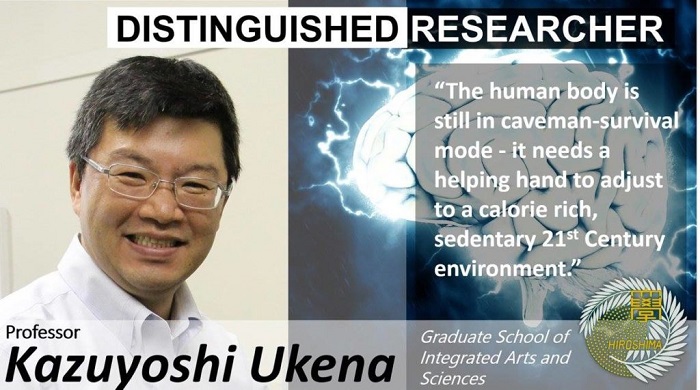
Can you introduce yourself please?
My name is Kazuyoshi Ukena, my specialty in neuroendocrinology – I focus on hormones in the brain.
What are you working on now?
I’m investigating never before documented neuropeptides. Neuropeptides are proteins used by neuronal cells to pass signals from one to another. I have recently found a new one in the hypothalamus, the brain control center, and we have found that it controls food intake and fat accumulation – so it has major implications for society as we try to tackle the obesity crises. The animals we investigate are rats, chickens, mice and sometimes fish and frogs.
What are you most proud of in your career?
These current studies into diet control mechanisms are major findings and the accumulation of my entire academic career. We are now throwing all our weight behind this research and expect more groundbreaking discoveries. At the minute, I am gathering grants and enlisting more students to achieve this – to advance it further.
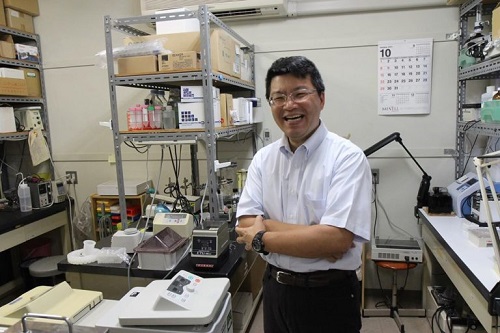
Obesity is a big problem in the world; are you saying we have no control over how much we eat, and our diet is controlled by hormones?
Our ancestors had to eat whenever they could in order to survive, those who did not eat might not make it through days of food scarcity. We believe we have evolved to have an increased appetite, even when we are full, as the body wants to increase energy stores for expected hard times ahead. We are increasingly finding that appetite and fat accumulation is hormonally controlled. Your conscience might be telling you to diet but millions of years of evolutionary hardwiring is telling you to have that second slice of cake!
So what will be the endgame of this research?
We should be able to develop chemicals or medicines that will help us reduce body weight. Obesity is a major health issue that leads to a host of life threatening diseases – our comfortable 21st Century lifestyles continue to encourage its onslaught. The human body is still in caveman-survival mode and it needs a helping hand from science to adjust to a calorie rich, sedentary environment. Simply put we want to eradicate obesity.
However, when we try to replicate such a structure using silica particles, the resultant color appears extremely faint.The color almost appears white due to the very strong light scattering properties.This leads to an incoherent hue.
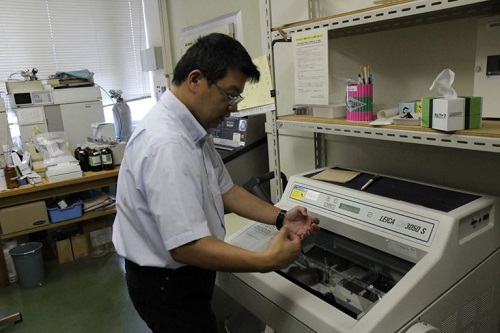
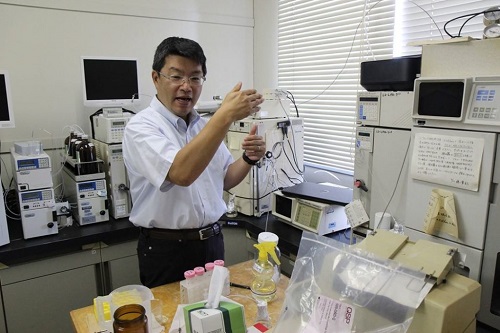
Do you have any other research interests?
I am very interested in instinctive behavior. Instinctive behavior often determines our quality of life – and disruption of instinctive behavior can cause problems. So it is not just diet I am interested in – also sleeping, exercise etcetera. Healthy societies and healthy people need to understand instinctive behaviors so that they can plan their lifestyle around such evolutionary demands. Such understanding is something I am involved with at the moment as leader of an international research group involving members from various European and American institutions.
We plan to publish many papers and hold seminars and events to highlight these often neglected and poorly understood impulses to science, and society and local communities as well.
What is the best thing about your job?
I like to find novel substances in the brain and resolve the function of such hormones. I am very interested in the physiological processes determining animal behavior.
What is your daily work life like?
I come to the lab at nine and return home at seven – but I continue work at home. I have a lot of work to get through, especially at the moment writing papers and sourcing grants.
Can you tell me about your background?
I hail from an island in Ehime prefecture, across the sea from Hiroshima. I entered this university at 18 years old. I am now 45. I have continued my current study my entire adult life.
Was there anything in your childhood that suggested you might become scientist in the future?
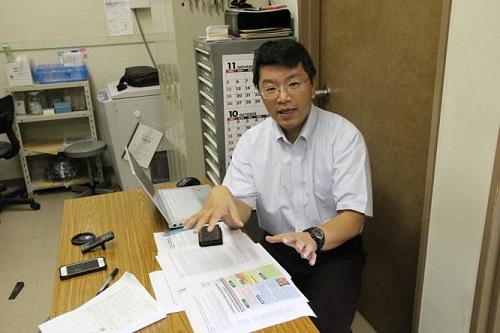
I only decided to become professor after entering this university at 18 years old. But, my parents were farmers and I was always interested in nature – in plants and animals.
Do you have hobbies outside of work?
Not these days as my research takes up all my time, but when I was younger I practiced Kendo – Japanese sword fighting.
What’s the best thing about working at HU?
Saijo is very peaceful and we are surrounded by nature. It allows us to concentrate on our research. On the other hand we are far from the academic meetings and discussions that take place in Osaka and Tokyo. Luckily internet technology is assisting in this regard.
I heard you work in California also, how do you find it?
I have been researching there for one year – at UC Berkeley. We collaborate very well on my neuropeptide research. They are very helpful to us and we have written many papers with them. I like it there – but the cost of living is extremely expensive!
Do you think it is it beneficial for students to carry out research overseas?
Yes, in California our students come from Israel, India, China – unfortunately there are few Japanese – this is a problem.
How do you think Japanese universities need to change to better compete on the global stage?
Japanese students and researchers need to improve their English language education so that we can collaborate internationally. And, we need more grants. The Japanese economy is still performing poorly and the government is reluctant to support scientific research – this needs to change. We also need to invest in English language science communication. At the minute, it is difficult to share our results with the outside world.
Personally, my current research on appetite, obesity, diabetes and instinctive behavior should be of interest around the world. If I can get enough research grants it will assist with the university’s goal of becoming one of the top 100 universities in the world.
Is it realistic that HU will become one of the top 100?
It will be very difficult but we will do our best to achieve it.
Your research involves analyzing the brains of many animals that require euthanized – how do you feel about that?
It is a necessity for us – the brain is a fantastic and mysterious organ and there is so much about it we do not know. Luckily, its mechanisms are similar across the vertebrate kingdom and by understanding rat and chicken brains etcetera; we can understand the human brain. We appreciate and are very grateful to the animals involved.


 Home
Home